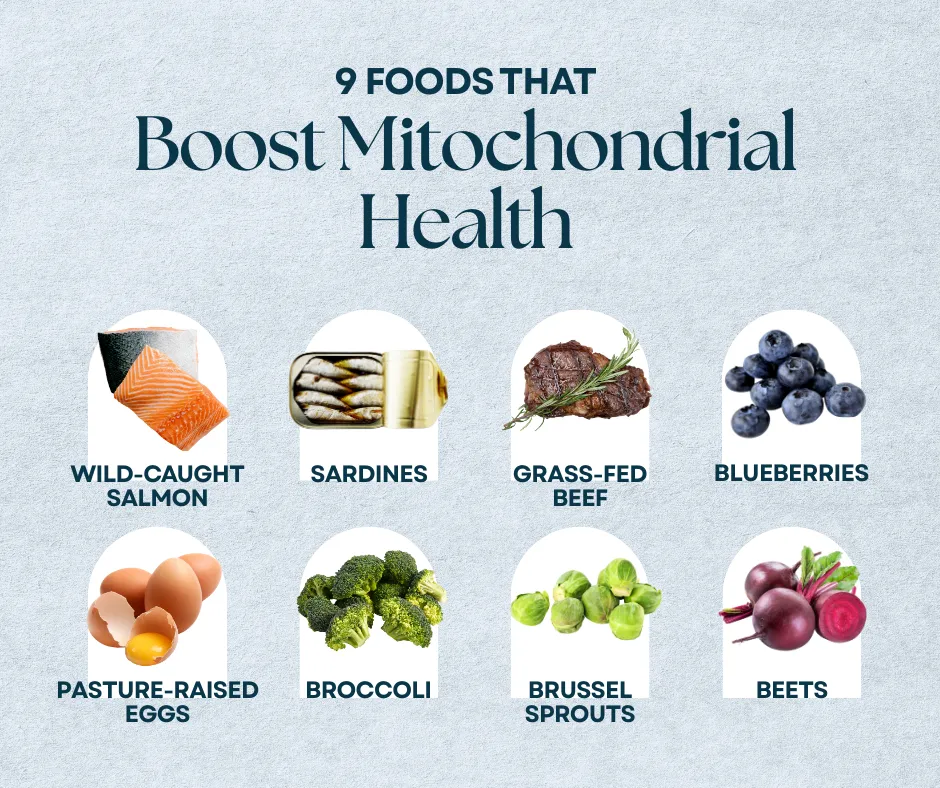
Fuel Your Powerhouse: 9 Foods That Boost Mitochondrial Health
Have you ever wondered what gives your cells the energy they need to function? The answer lies in tiny structures called mitochondria. Often referred to as the "powerhouses of the cell," mitochondria play a crucial role in converting the food we eat into energy that our bodies can use. When our mitochondria aren't functioning optimally, we may experience fatigue, brain fog, and a host of other health issues.
The good news is that certain foods can help support and enhance mitochondrial function. Let's explore nine powerhouse foods that can help boost your mitochondrial health and overall vitality.
Understanding Mitochondrial Health
Before diving into the specific foods, it's important to understand why mitochondrial health matters. Mitochondria are responsible for producing adenosine triphosphate (ATP), the energy currency of our cells. Healthy mitochondria mean more efficient energy production, which translates to better overall health, improved cognitive function, enhanced physical performance, and increased longevity.
9 Mitochondria-Boosting Foods
1. Wild-Caught Salmon
Rich in omega-3 fatty acids and astaxanthin, wild-caught salmon helps reduce inflammation in the body and supports mitochondrial membrane health. The high-quality protein also provides essential amino acids necessary for cellular repair and energy production.
2. Sardines
These small fish are packed with coenzyme Q10 (CoQ10), a compound essential for mitochondrial energy production. Sardines also provide omega-3 fatty acids and vitamin D, both of which support overall mitochondrial function.
3. Grass-Fed Beef
Grass-fed beef contains higher levels of conjugated linoleic acid (CLA), omega-3 fatty acids, and antioxidants compared to grain-fed beef. It's also rich in iron and B vitamins, which are crucial for energy metabolism and mitochondrial health.
4. Pasture-Raised Eggs
Eggs from pasture-raised chickens contain more omega-3s and vitamin D than conventional eggs. They're also rich in choline, a nutrient that supports mitochondrial membrane integrity and function.
5. Broccoli
This cruciferous vegetable contains sulforaphane, a compound that activates mitochondrial biogenesis (the creation of new mitochondria). Broccoli is also rich in antioxidants that protect mitochondria from oxidative damage.
6. Brussel Sprouts
Like broccoli, Brussel sprouts contain sulforaphane and other compounds that support mitochondrial health. They're also packed with vitamins C and K, fiber, and antioxidants that protect cellular structures.
7. Blueberries
These little berries are antioxidant powerhouses, containing anthocyanins that protect mitochondria from oxidative stress. Studies suggest that the compounds in blueberries can enhance mitochondrial function and support cognitive health.
8. Walnuts
Walnuts are rich in polyphenols and alpha-linolenic acid (ALA), a plant-based omega-3 fatty acid. These compounds help reduce inflammation and oxidative stress, both of which can damage mitochondria over time.
9. Beets
Beets are rich in nitrates, which the body converts to nitric oxide. Nitric oxide helps improve blood flow and oxygen delivery to tissues, supporting mitochondrial energy production. Beets also contain betalains, powerful antioxidants that protect cellular structures.
Incorporating These Foods Into Your Diet
Adding these mitochondrial-boosting foods to your diet doesn't have to be complicated. Here are some simple ideas:
Start your day with pasture-raised eggs and a side of Brussel sprouts
Enjoy a salad topped with grilled wild-caught salmon and walnuts
Snack on blueberries or incorporate them into smoothies
Roast beets as a delicious side dish
Include grass-fed beef in your weekly meal rotation
Steam broccoli as a quick and nutritious side dish
Beyond Nutrition: Supporting Mitochondrial Health
While nutrition plays a crucial role in mitochondrial health, other lifestyle factors are also important:
Regular exercise, particularly high-intensity interval training (HIIT)
Adequate sleep and rest
Stress management techniques like meditation and deep breathing
Limited exposure to environmental toxins
Cold exposure and heat therapy
Take Charge of Your Cellular Health
Your mitochondria are fundamental to your overall health and vitality. By incorporating these nine foods into your diet and adopting a mitochondria-friendly lifestyle, you can support your cellular powerhouses and enhance your energy, cognitive function, and overall wellness.